Boeing has grounded its entire global fleet of 737 Max aircraft after new evidence was uncovered at the scene of a fatal Ethiopian Airlines crash.
The plane crashed minutes after taking off from Ethiopian capital Addis Ababa on Sunday, killing all 157 people on board. It was the second fatal accident involving a Boeing 737 Max 8 aircraft in five months.
It is unclear why the plane, bound for Kenyan capital Nairobi, nosedived or whether the incident is related to last October's Lion Air 737 Max 8 crash in Indonesia, which left 189 dead.
However, the US Federal Aviation Administration (FAA), investigating the crash, has said it is clear the Ethiopian Airlines flight behaved "very similarly to the Lion Air flight".
Here's what we know about the Ethiopian Airlines crash so far.
1. The accident happened shortly after take-off
The delayed flight ET302 took off from Ethiopian capital Addis Ababa at 08:38 local time (05:38 GMT) and was bound for Kenyan capital Nairobi.
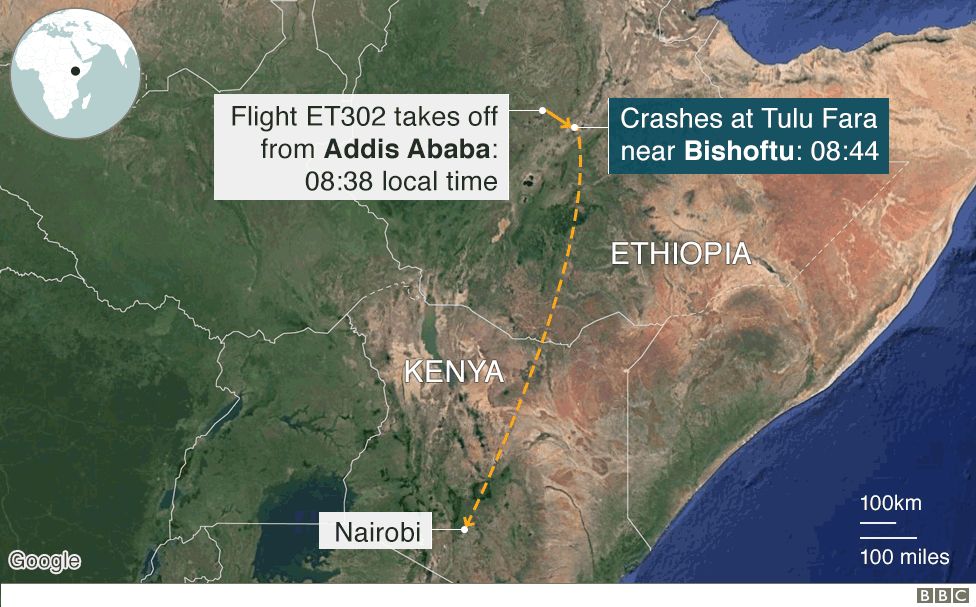
It crashed 30 miles southeast of the airport, approximately six minutes into its two-hour flight, close to the village of Tulu Fara near the town of Bishoftu.
The flight had been due to depart at 08:15 local time.
2. The plane's vertical speed appeared 'unstable'
The cause of the disaster is not yet clear. But the pilot had reported difficulties and asked to return to Addis Ababa, Ethiopian Airlines has said.
Visibility was said to be good but air traffic monitor Flightradar24 reported that the plane's "vertical speed was unstable after take-off".
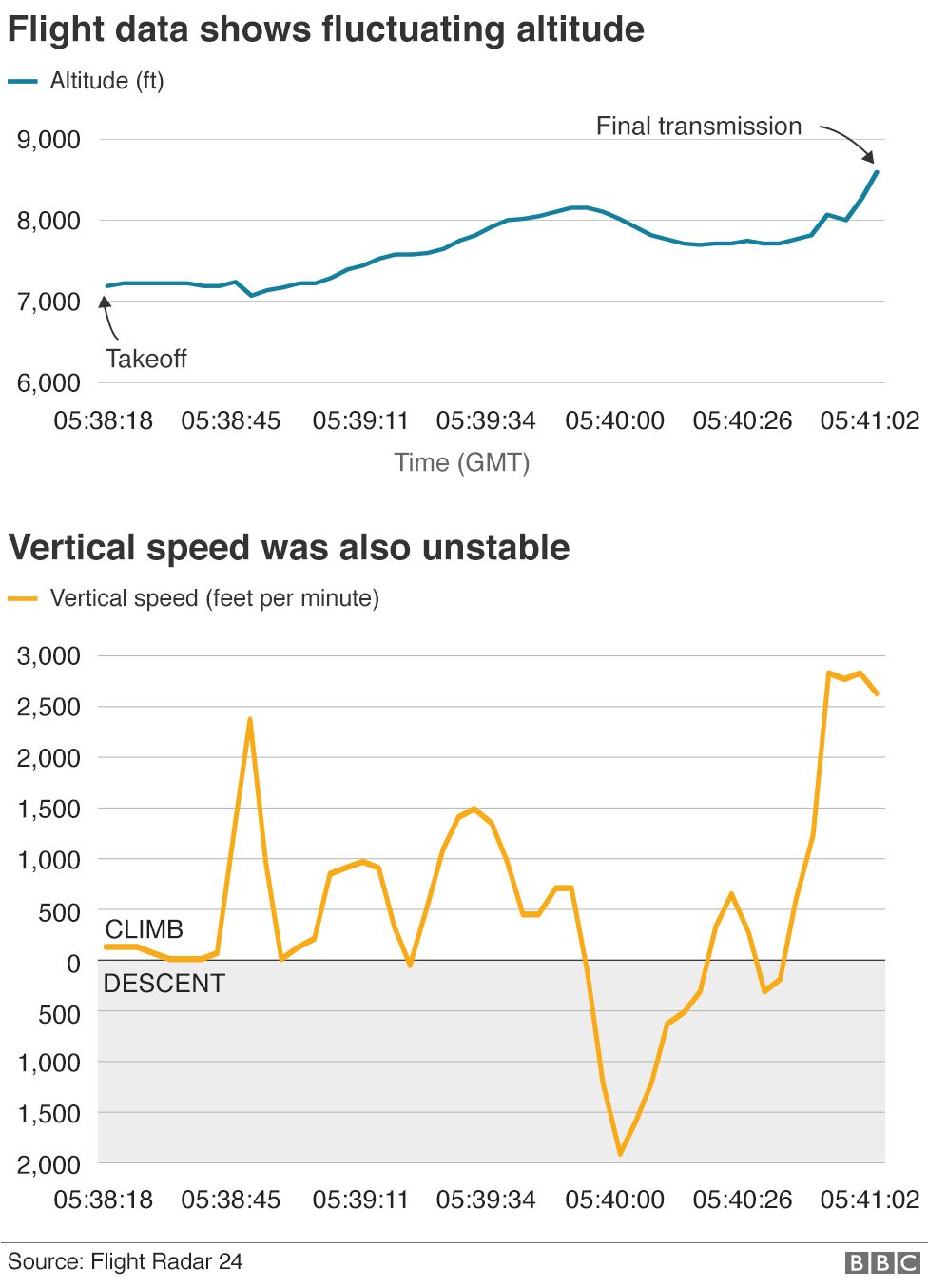
The pilot was named as Senior Capt Yared Getachew who Ethiopian Airlines said had a "commendable performance" with more than 8,000 hours in the air.
Following last October's Lion Air crash in Indonesia, investigators said the pilots had appeared to struggle with an automated system designed to keep the plane from stalling, a new feature of the jet.
It is not yet clear whether the anti-stall system was the cause of the Ethiopian Airlines crash. Aviation experts say other technical issues or human error cannot be discounted.
However, the FAA, investigating the crash alongside the Ethiopian National Transportation Safety Board, has said new evidence collected at the site and satellite data showed the two flights behaved "very similarly".
"The evidence we found on the ground made it even more likely the flight path was very close to Lion Air's," said Dan Elwell, acting administrator at the FAA.
The black box flight recorders - the Flight Data Recorder and Cockpit Voice Recorder - from the aircraft have been flown to Paris for analysis.

3. Questions have been raised over a new automatic control system
After last year's Lion Air disaster, Boeing issued guidance to pilots on how to manage the 737-Max's new computer-controlled stability system.
The MCAS, which stands for Manoeuvring Characteristics Augmentation System, is designed to prevent the plane stalling when making steep turns under manual control.
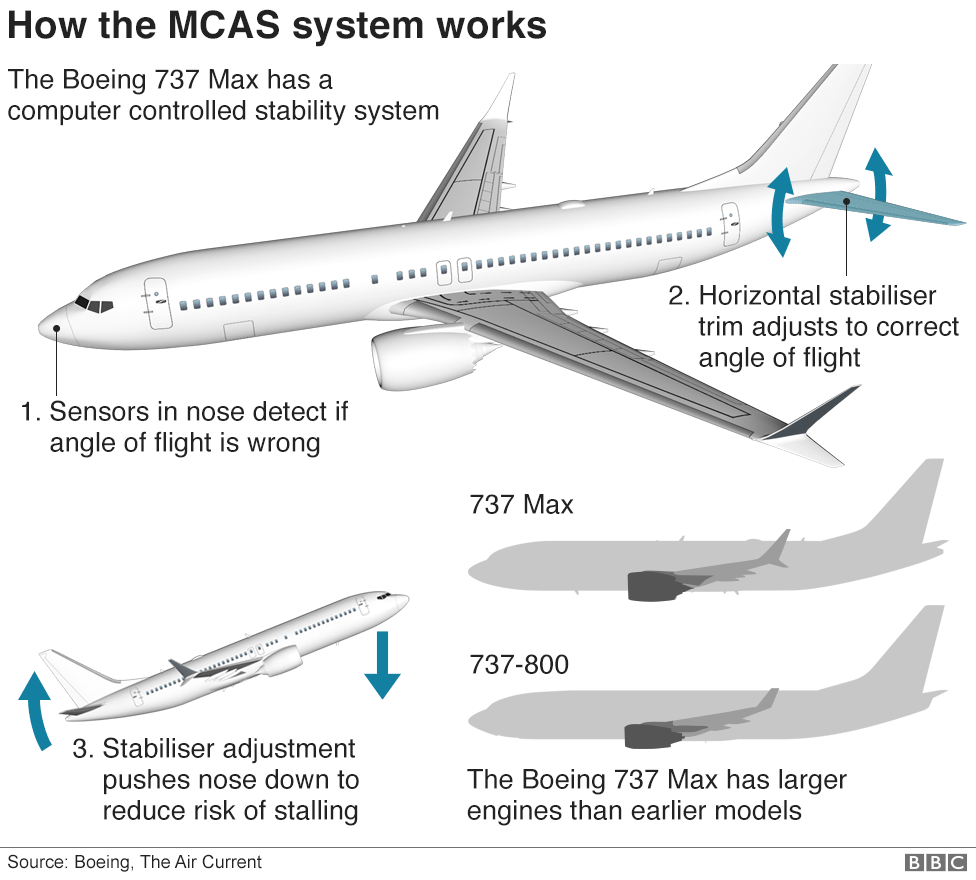
A stall can happen when the angle at which the plane is flying gets too steep. This can reduce the lift generated by the wings, potentially making the plane drop.
To recover from a stall, a pilot would normally push the plane's nose down. In the 737 Max, MCAS does this automatically, moving the aircraft back to a "normal" flight position.
The system continues to repeat the process if the computer detects the plane is still tilted at a too-high angle.
After the Lion Air crash, it was disclosed that the aircraft involved had experienced problems with a sensor which calculates the angle of flight.
CNN have reported that US-based 737 Max pilots have filed complaints about the performance of MCAS in flight, including reports of the system operating while autopilot is switched on, which should not occur.
Boeing has said it "continues to have full confidence in the safety of the 737 Max".
However, it decided to ground the flights "out of an abundance of caution and in order to reassure the flying public of the aircraft's safety".
A software fix for the 737 Max that Boeing has been working on since the fatal Indonesia crash will take months to complete, the FAA has said.

4. The Boeing 737 Max is quite new
The Boeing 737 Max fleet of aircraft are the latest in the company's successful 737 line. The group includes the Max 7, 8, 9 and 10 models.
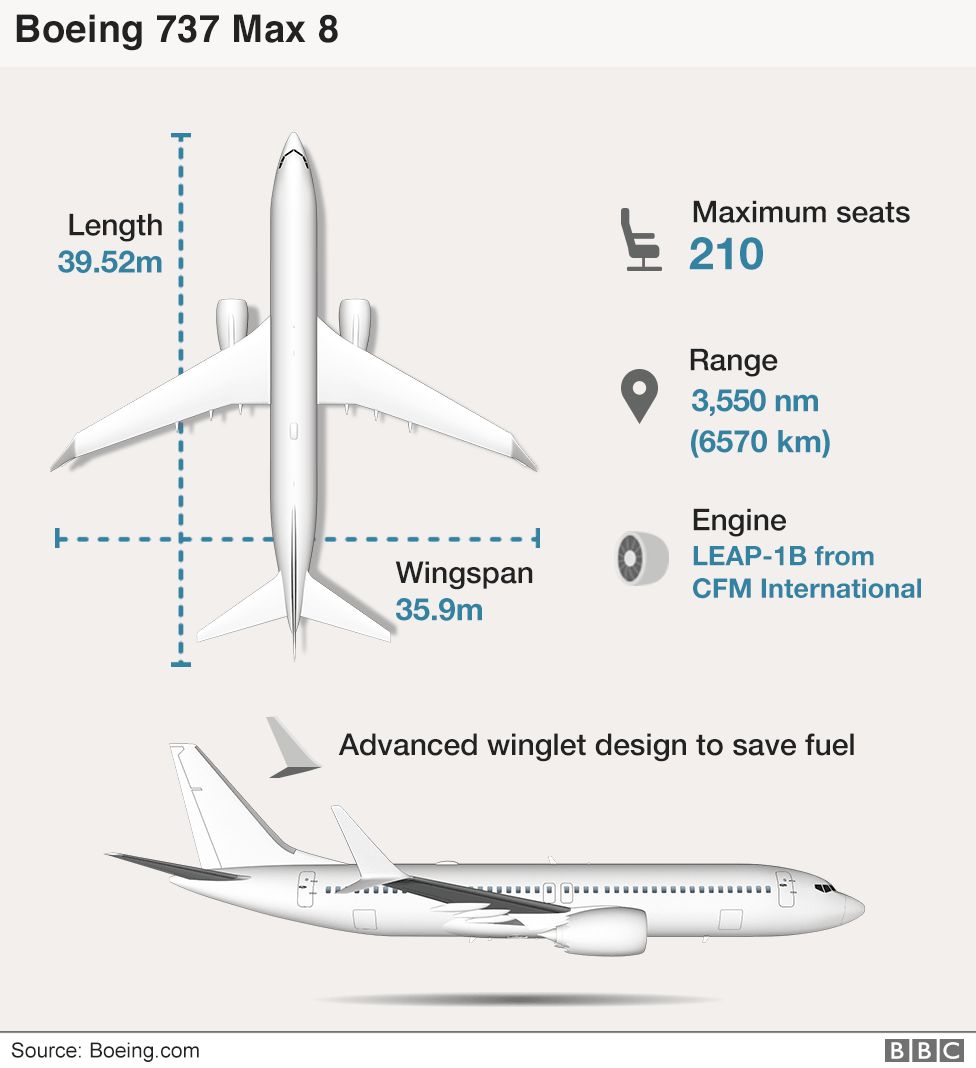
The Boeing 737 Max has been the fastest-selling aircraft in Boeing's history, with more than 4,500 ordered by 100 different operators globally.
By the end of January, Boeing had delivered 350 of the Max 8 models. They have been in commercial use since 2017.
The Max 8 that crashed on Sunday was one of 30 ordered as part of Ethiopian Airlines' expansion. It underwent a "rigorous first check maintenance" on 4 February, the airline said.
A small number of Boeing's Max 9s are also operating. The Max 7 and 10 models, not yet delivered, are due for roll-out in the next few years.

5. A number of countries have grounded the aircraft
The US and Brazil became the latest countries to suspend the Boeing 737 Max from flying after nations including the UK, China, India and Australia all grounded the aircraft.
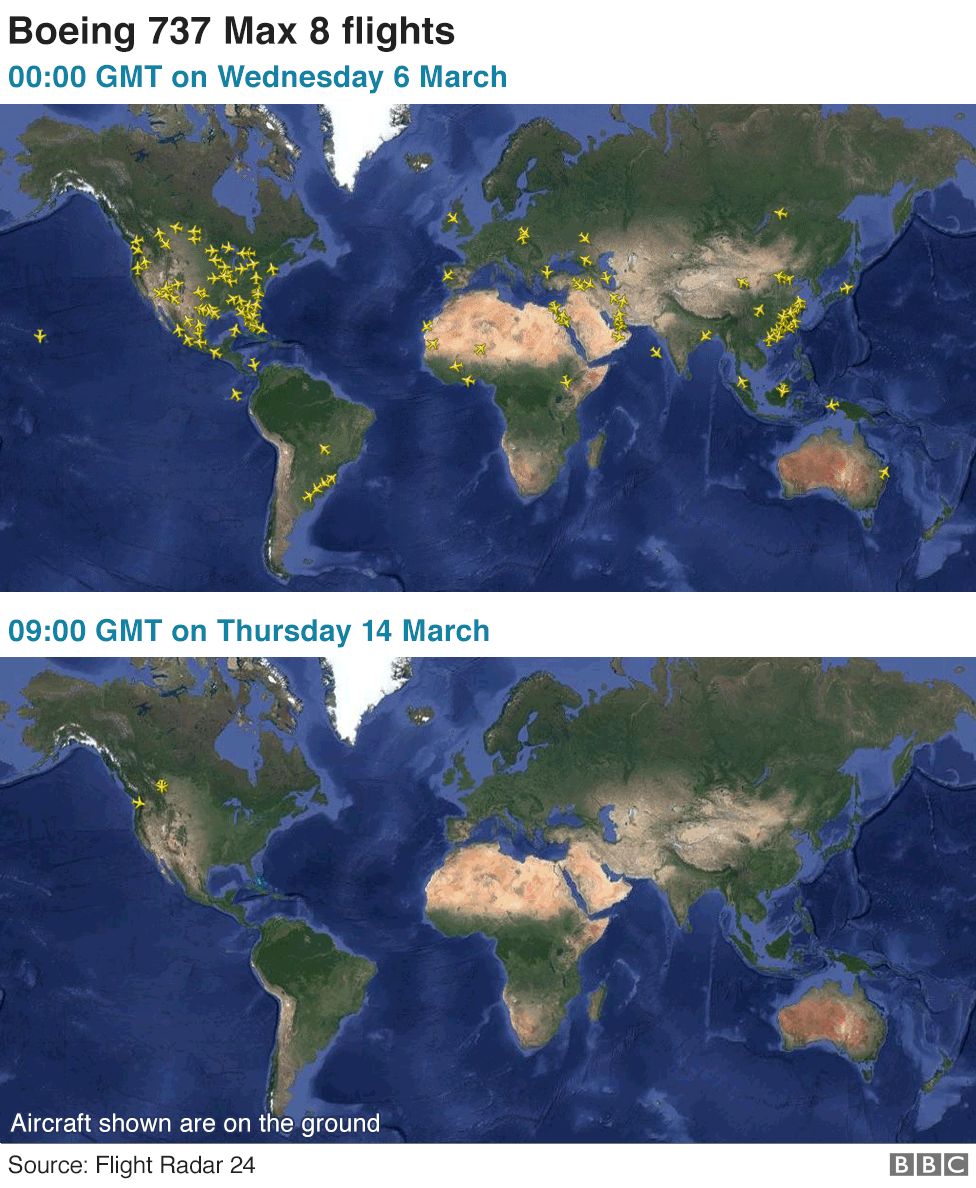
Canada grounded its Boeing 737 Max planes after its transport minister Marc Garneau said he had evidence of possible similarities between flight patterns of planes in Canada and the Ethiopian Airlines plane that crashed.

6. Many airlines have Max 8 models
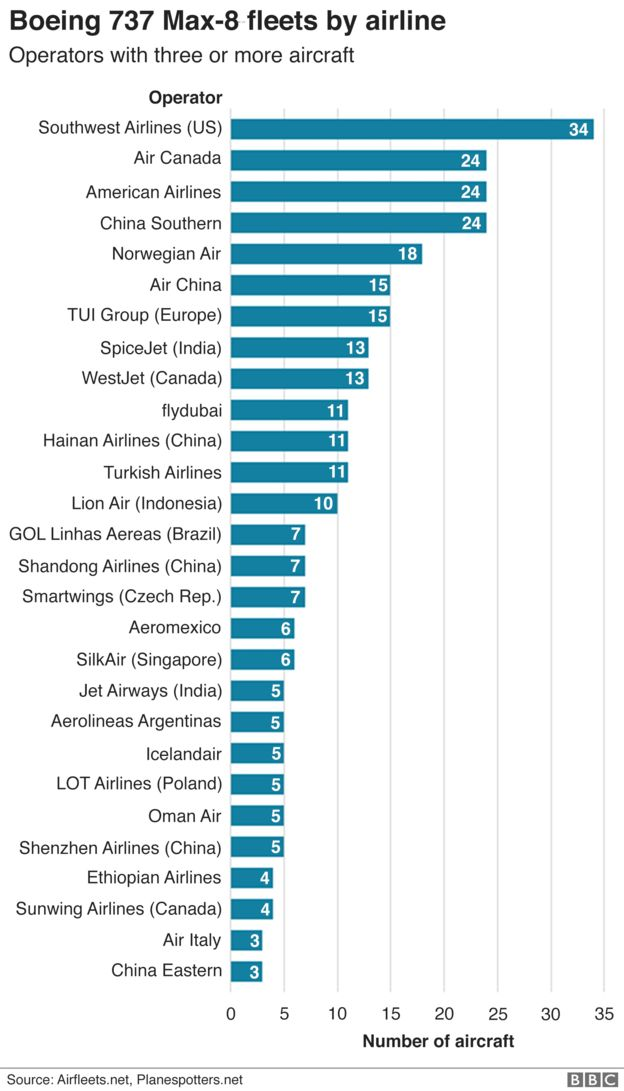
Southwest Airlines has removed all of its 34 Max 8 planes from scheduled service.
Although the airline has the biggest fleet of Boeing 737 Max 8 planes in the world, it says they account "for less than 5% of our daily flights".
It said it is offering "flexible rebooking policies" which means that any customer booked on a cancelled Max 8 flight can rebook on alternative flights "without any additional fees or fare differences within 14 days of their original date of travel".
American Airlines said 24 of its aircraft would be affected by the suspension, while United Airlines said that its Max aircraft account for roughly 40 flights a day.
Both said they would be rebooking customers.
Latest Stories
-
COP Tiwaa Addo-Danquah’s bust at EOCO destroyed
29 minutes -
Trump threatens ‘very high’ tariffs on Denmark over Greenland
1 hour -
Full text: Mahama inaugural speech
1 hour -
CAF increases CHAN prize money to $3.5m
1 hour -
NFF appoints Éric Chelle as Head Coach of the Super Eagles
1 hour -
Collins Adjei Kuffuor writes: Mahama’s inaugural speech – a blueprint for Ghana’s future
2 hours -
Ghana is open for business again – Mahama assures business communities
2 hours -
Sege MP holds dinner with TOSA 96
2 hours -
Collins Adjei Kuffuor writes: Ghana’s tax system needs urgent reform
2 hours -
Rebecca Tweneboah Darko: ‘I love you King Promise, marry me’
3 hours -
Who becomes Mahama’s minister for Tourism, Arts and Culture?
4 hours -
Dagbani Wikimedia User Group honours 11 Wikimedians for excellence in 2024
4 hours -
Rebuilding of Kantamanto must meet fire safety standards – GNFS
4 hours -
Centre for Social Justice applauds Mahama’s return as President
5 hours -
CDKN trains early career researchers on knowledge brokering, science communication
5 hours

